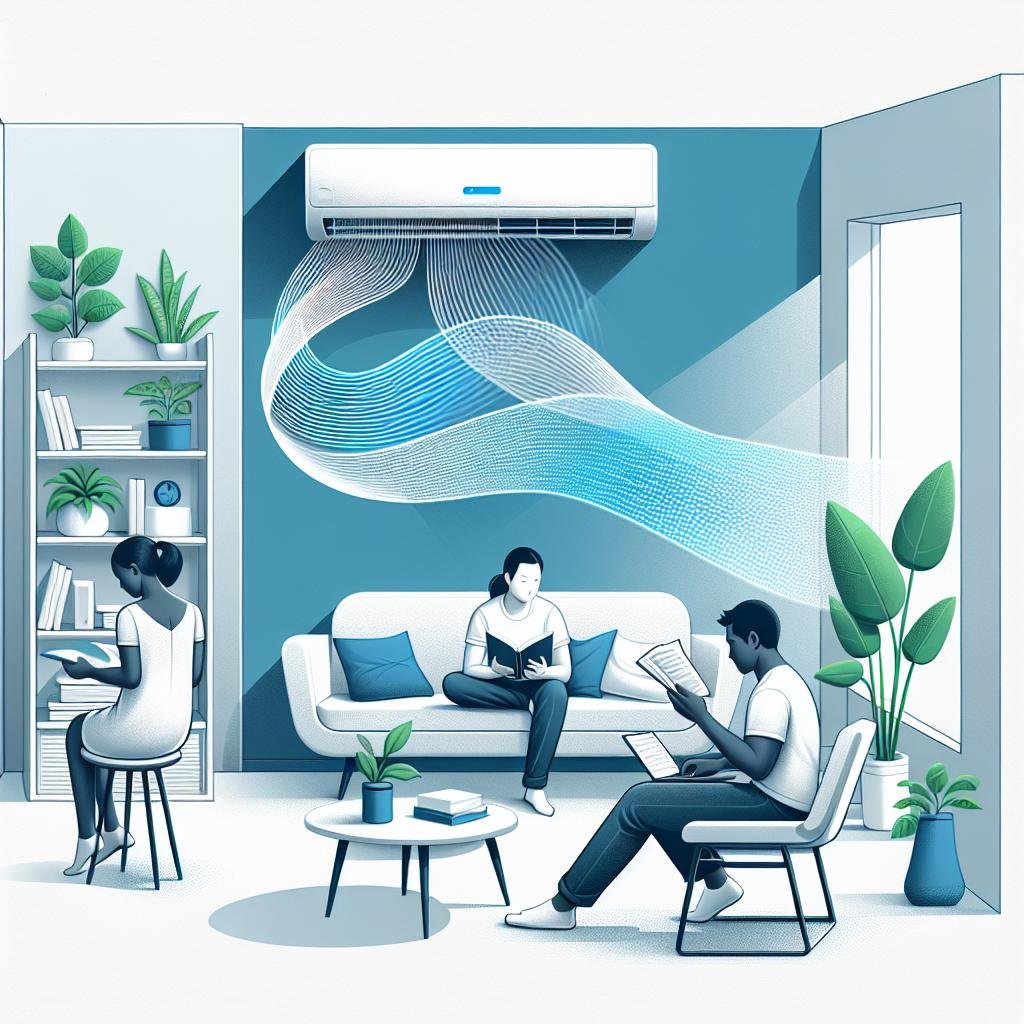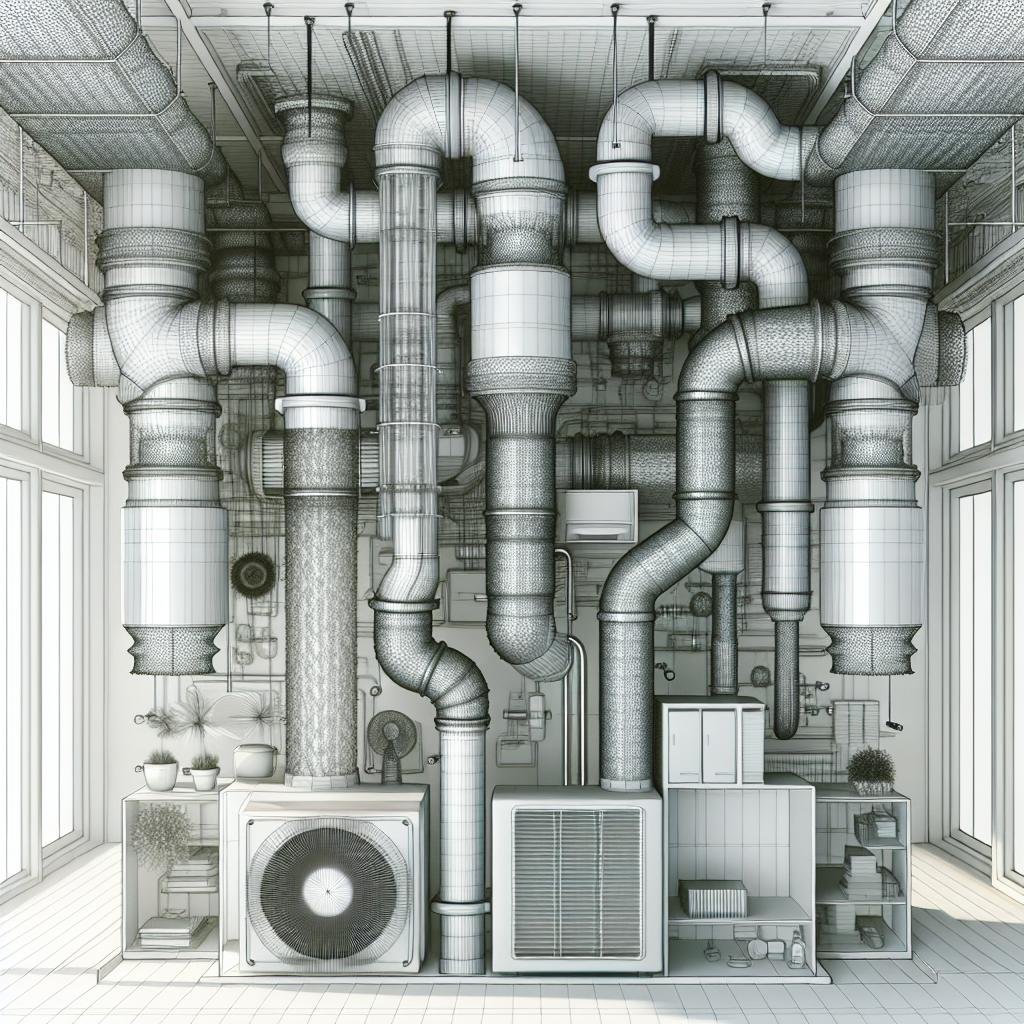When the sun beats down and the humidity creeps up, there’s nothing quite like the refreshing coolness of a mini split air conditioning system to keep your indoor oasis comfortable. But as we savor that chill, have you ever thought about what happens to the air inside? Just as important as cooling down our homes is ensuring we have fresh, clean air to breathe. Proper ventilation and exhaust are key to creating a healthy indoor environment, especially when relying on split AC systems that can sometimes leave us feeling a bit stuffy. In this article, we’re going to unravel the secrets of effectively ventilating and exhausting indoor air, so your space can be both cool and crisp. Join us on this journey to discover how to keep your air flowing freely and your spirit soaring high, all while maximizing the efficiency of your beloved mini split AC!
Understanding the Importance of Indoor Air Quality with Mini Split ACs
Air quality plays a vital role in maintaining overall health and comfort in your indoor spaces. Mini split AC systems are not just great for temperature control; they significantly contribute to improving indoor air quality by offering effective filtration and circulation. With advanced filtration systems in place, these units can remove allergens, dust, and pollutants from the air, providing a fresher environment for you and your family. By ensuring that your mini split system is equipped with HEPA filters or other high-efficiency options, you can effectively reduce the risk of respiratory issues and create a healthier living space.
Furthermore, balancing ventilation and exhaust is crucial when using mini split ACs. An effective air exchange system helps prevent the buildup of indoor contaminants while maintaining a comfortable and consistent temperature. To achieve optimal results, consider the following tips:
- Regularly check and clean filters to ensure maximum airflow.
- Utilize exhaust fans in kitchens and bathrooms to remove humidity and odors.
- Incorporate fresh air intakes if possible, allowing outdoor air to circulate.
Monitoring indoor air quality doesn’t have to be complicated. Simple adjustments to how you operate your mini split system can make a significant difference. Here’s a quick reference table for some useful indoor air quality improvement tips:
| Tip | Description |
|---|---|
| Regular Maintenance | Schedule routine checks for your AC system and filters. |
| Indoor Plants | Introduce plants that purify the air, like peace lilies or spider plants. |
| Humidity Control | Use dehumidifiers if necessary to maintain ideal humidity levels. |
Mastering Fresh Air Intake: Tips for Optimal Ventilation
Properly managing fresh air intake is crucial for achieving optimal indoor air quality, especially when using mini split AC systems. Unlike conventional HVAC systems, mini splits allow for zoning and individual room control, which can enhance ventilation efficiency. To master this process, consider the following strategies for ensuring adequate fresh air circulation:
- Utilize exhaust fans: Install exhaust fans in areas prone to moisture, like kitchens and bathrooms, to facilitate air exchange.
- Open windows when possible: Take advantage of natural ventilation on pleasant days to allow fresh air inside while letting stale air escape.
- Air vents in use: Ensure air vents are open and unobstructed to allow proper airflow from both the mini split and surrounding areas.
- Integrate air purifiers: Adding air purifiers can improve indoor air quality by filtering out pollutants and allergens, complementing your mini split’s ventilation.
Understanding the relationship between temperature and humidity is also key in mastering ventilation. High humidity environments can cause discomfort and foster mildew; therefore, maintaining indoor humidity levels is essential. Utilizing a hygrometer can help you monitor these levels effectively. Here’s a simple reference table for optimal humidity percentages based on indoor temperatures:
| Indoor Temperature (°F) | Recommended Humidity (%) |
|---|---|
| 60 – 65 | 30 – 40 |
| 66 – 70 | 35 – 45 |
| 71 – 75 | 40 - 50 |
| 76 – 80 | 45 - 55 |

Creating an Effective Exhaust System for Cleaner Indoor Spaces
Installing a well-designed exhaust system is essential for maintaining a healthy indoor environment, particularly when utilizing mini split AC systems. These units are fantastic for cooling and heating, but they can contribute to stagnant air if not paired with proper ventilation. An effective exhaust system improves air quality by expelling stale air and introducing fresh air into your space, helping to reduce moisture levels, odors, and pollutants. To create a cleaner indoor atmosphere, consider the following strategies:
- Choose the Right Location: Place exhaust fans in areas such as kitchens and bathrooms where humidity and odors are typically high.
- Utilize Ductless Ventilation: Ensure that exhaust systems don’t just rely on ductwork; integrating ductless options can help target specific areas more effectively.
- Install Timers and Sensors: Automate your exhaust system with timers or humidity sensors to ensure it operates efficiently when it’s most needed.
To visualize how various exhaust components work together, here’s a simple breakdown of system elements:
| Component | Function |
|---|---|
| Exhaust Fan | Expels stale air from the room. |
| Fresh Air Intake | Brings in clean outdoor air. |
| Ductless System | Provides targeted heating and cooling. |
Implementing these suggestions will greatly enhance the effectiveness of your mini split AC systems while fostering a more inviting indoor atmosphere. By thoughtfully integrating ventilation and exhaust solutions, you can achieve optimal air quality, creating spaces that are not just comfortable but also healthier for everyone who enters.

Maintaining Efficiency: Regular Checks and Upgrades for Your AC System
To keep your mini split AC system running at its best, regular checks and timely upgrades are essential. Just like any other appliance in your home, your air conditioning unit requires a bit of TLC to maintain peak performance. This involves not only routine cleaning of the filters but also inspecting the outdoor and indoor units for any signs of wear or obstruction. Over time, dust and debris can accumulate, affecting airflow and efficiency. It’s advised to schedule these checks at least seasonally to prevent any major malfunctions. Remember, your unit’s longevity depends significantly on how well you care for it!
Additionally, upgrades can play a pivotal role in enhancing your system’s effectiveness. Investing in smart thermostats or newer, energy-efficient models can provide your home with better climate control and can help reduce energy bills as well. Consider the following upgrades when you’re assessing your system:
| Upgrade | Benefits |
|---|---|
| Smart Thermostat | Improved energy management |
| Enhancing Insulation | Reducing cold air loss |
| Variable Speed Compressors | Better temperature regulation |
By placing an emphasis on both routine maintenance and timely upgrades, you not only enhance the efficiency of your unit but also ensure a comfortable living environment throughout the year. Prioritizing these aspects means you can enjoy a cool, clean haven while spending less on energy and repairs!
Q&A
Q&A: How to Properly Ventilate and Exhaust Indoor Air with Mini Split AC Systems
Q1: What’s the first thing I should know about mini-split AC systems?
A1: Great question! Mini-split AC systems are like the stylish, efficient cousins of traditional HVAC systems. They not only cool or heat different zones in your home but also provide excellent air circulation. However, while they excel at temperature control, proper ventilation is key to maintaining good indoor air quality. Think of it like giving your home a breath of fresh air!
Q2: Why is ventilation important when using a mini-split AC?
A2: Imagine living in a cozy bubble where the air is as stale as week-old bread – not ideal, right? Proper ventilation ensures that fresh air enters your home, replacing stale, contaminated air. This is especially vital in smaller spaces that rely on mini-split AC systems. Good ventilation helps reduce indoor pollutants, allergens, and humidity levels, keeping the air you breathe healthy and fresh.
Q3: Can a mini-split AC system provide enough ventilation on its own?
A3: While mini-splits do circulate air well, they don’t inherently ventilate. They recycle the air in your space but don’t bring in new air from outside. So, you might need to open a window or two, strategically place air purifiers, or use exhaust fans in humid spaces like kitchens and bathrooms for a balanced airflow. Think of your mini-split as your air conditioner sidekick – it’s great at cooling but needs a little help with ventilation!
Q4: What are some effective ways to exhaust indoor air while using a mini-split?
A4: You’re in for a treat! Here are a few friendly tips to improve ventilation with your mini-split:
- Use Exhaust Fans: In areas like kitchens and bathrooms, a well-placed exhaust fan can work wonders. It pulls out stale air, moisture, and odors quickly.
- Open Windows Correctly: During cooler parts of the day (like early morning or late evening), consider opening windows for cross-ventilation. Position fans to help push stale air out and pull fresh air in.
- Air Purifiers: These handy gadgets can filter and refresh the indoor air without opening a window. They’re particularly great in allergy season!
- Install a Fresh Air Intake System: For a permanent solution, consider adding a fresh air intake to your mini-split system, allowing a controlled amount of outdoor air to mix with the indoor air.
Q5: How can I maintain my mini-split AC to ensure it best aids my ventilation efforts?
A5: Maintenance is the key to a happy mini-split! Here are some must-dos:
- Regular Filters Cleaning: Dirty filters reduce efficiency and can breed bacteria. Clean or replace them monthly for optimal airflow.
- Check Drain Lines: Ensure that the condensate drain isn’t blocked since moisture build-up can lead to mold growth.
- Professional Servicing: Schedule yearly check-ups with a professional. They will ensure everything is running smoothly and can offer advice tailored specifically to your home.
Q6: What’s the one takeaway I should remember about ventilating with mini-split AC systems?
A6: Remember, ventilation is a team sport! Your mini-split system is great at regulating temperature, but for the best indoor air quality, combine it with fresh air supplies and smart exhaust solutions. Keep the air flowing, and your indoor oasis will always feel rejuvenating!
So there you have it! Now you’re equipped to make your indoor space as fresh as a spring morning while enjoying the comforts of your mini-split AC system. Happy cooling!
The Conclusion
As we wrap up our journey through the world of proper ventilation and exhaust with mini split AC systems, remember that maintaining a breath of fresh air at home is not just about comfort—it’s about creating a healthy environment for you and your loved ones. By implementing the tips and guidelines we’ve discussed, you’re not only optimizing your cooling system but also nurturing the air that fills your space with life and vitality.
So, whether you’re tackling humidity in the summer or chasing away stale air in the winter, take pride in the little adjustments you make. After all, your home is your sanctuary, and it deserves to be as inviting and refreshing as a gentle breeze on a warm day.
If you have questions or would like to share your own tips and experiences, we invite you to join the conversation! Let’s keep the dialogue going and inspire one another to breathe easier and live better. Until next time, may your indoor air be as crisp and invigorating as the great outdoors! 🌬️✨

